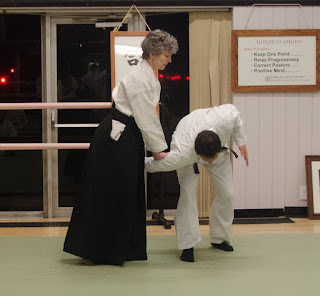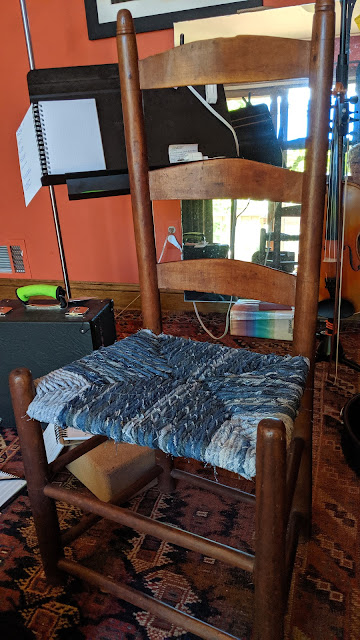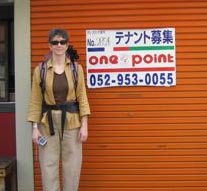Comparing Kokikai Aikido to Other Martial Arts - A Survey
I've practiced the same martial art, Kokikai Aikido, for over 22 years. Even though I've written elsewhere about how to choose the best martial art, I've never tried another aikido style, or even another martial art. I lucked out and landed in a practice that's perfect for me, with a highly effective curriculum, a world-class founder, amazing senior instructors, and I never saw the need to look elsewhere.
Even so, it's always bothered me that a lot of other martial artists consider aikido to be a "joke." I can't speak for other styles, but there's no question in my mind that Kokikai Aikido is effective. Our founder, Shuji Maruyama Sensei, personifies everything that aikido ever claimed to do or be: small of stature, powerful, effective, without harm to opponent. But he's always been reticent about blowing his own horn or putting video of himself on YouTube, so I can see why most people don't know much about him or his style. So, I asked some of my fellow students to give their comparative viewpoints...
The (Highly Informal) Survey:
The Answers (edited for brevity):
Rick: I wanted to learn internal energy development to aid my tae kwon do practice but stayed because as I got older and a little slower had more trouble entering defenses. Kokikai Aikido taught me to wait, allow my opponent to come to me and the setups were automatically there. I am going on
David: I studied a different style of aikido for about 5 years and then stopped for about 15 years. I then decided to study Kokikai, mostly because the dojo was close to my house (in Tempe, AZ), and I was impressed by the teachers there. The reasons for staying are somewhat more complex, but suffice it to say that at my age, I can still do Kokikai. I don't think I could say the same had I stayed with my previous style.
Debbie: Karate made me strong. But Aikido taught me that you can see things from a different perspective, and that really changes how you react to a threatening situation.
Nancy: I've recently been visiting practice groups for other aikido styles because there are no Kokikai dojo where I live now. I noticed that practicing in these other classes didn't look like fun to me. Also, after years of training Kokikai Aikido under Maruyama Sensei my eye is trained to see that there are a lot of weak spots, and places where the techniques don't look natural or logical. I'm so glad to have studied under Sensei and the other teachers I've had! Choosing the right teacher is really important!
Frank: I trained in tae kwon do (TKD) for 7 years before coming to Kokikai Aikido, which I've been practicing for the last 20 years. I was fortunate to have found dedicated lifelong master martial artists as teachers in both arts; ones that innovate and are intimate with the subtleties of their arts. That is RARE.
I practiced in TKD in the better part of my 20s, when I was at my most athletic. I learned a lot about striking and generating power, correct technique involving relaxed strength combined with smooth movement, clean footwork and acceleration. I had a lot of fun. Sustained some injuries, broken bones, nose, ribs, deep bruises. In any competitive encounter no matter how good you are, you will get hit and it doesn't take much to sustain a serious injury especially from a strong attack. Good fighters that are quick and strike with power and precision end things quickly.
With that experience I came to Kokikai. 20 years later, I'm still here, very grateful for my teachers and for the fellowship of the community of respectful, helpful, experienced, mature, lifelong practitioners - also rare. I'm grateful for ukemi; learning to get thrown, fall down and get up gracefully is sometimes completely overlooked as the backbone of good practice. It's health-giving, literally and metaphorically, and a priceless skill on and off the mat. Finally I'm grateful for the 4 basic principles of Kokikai Aikido, which are personified most dramatically in Sensei. I feel blessed and lucky to have found a practice that is always challenging my understanding ability and limits both as a student and teacher.
Jason: In kung fu there was a lot more focus on strengthening and conditioning the body with push-ups, crunches and squats. In aikido, practicing things like relaxing under pressure and avoiding resistance helped me outside the dojo way more than repeatedly executing 12 different types of punches and kicks.
Christopher: Compared to other styles of aikido, Kokikai stressed correct feeling almost from the very start. It made it harder to learn at first, but I believe I got a deeper understanding of aikido much earlier than I would have otherwise.
Dave: I have some experience with jiu jitsu and judo. One style of jiu jitsu I did for about a year was great if you want to learn how to lay out an attacker. What I like about aikido is almost the pacifist approach to self-defense. If I really wanted to defend myself and didn't care about the welfare of an attacker, I'd practice something like krav maga. Or just get a gun...
Bill: I studied a Korean art that seemed to have a lot of techniques, but after a while there wasn't a sense that it grew. It just got to a point of changing the katas but no new technique or improved way of doing things...Kokikai keeps growing and improving.
Debora: I practiced a Japanese hard style karate for 25 years before coming to Kokikai Aikido. I knew what I wanted in a style and visited several aikido schools before committing to Kokikai. A healthy organization with good leadership is essential. Another quality I looked for was respectful treatment of both instructors and students. Finally, I was looking for a style that taught effective self-defense. This is not because I felt the need to be safe, as I had accomplished that fairly well in karate. It was more because I understood how challenging it is to do what all aikido styles claim to do, which is to make technique more powerful without resorting to muscle power. Kokikai Aikido, under Sensei's leadership, is always evolving into something better. This quality is rare and the main reason why I have remained for many years.
Abhijit: I started with a different style of aikido, and practiced for about a year before switching to Kokikai. Kokikai has an explicit feedback system, through ki testing and appropriate resistance, that helped me improve both myself and my technique. The principles also helped me evaluate the technique I saw. Previously I felt I was being told not to resist - follow the lead, take the fall when you are "supposed" to. I was never sure whether I was actually doing things in ways that worked or that my partner was always being nice to me. In Kokikai, there was no way I could resist! I also felt the techniques taught wouldn't work for smaller people (the instructor was a big guy). In Kokikai, that's certainly not the case! [The founder of Kokikai weighs under 130 lbs.] Kokikai principles have helped me continue to learn and grow and find some new nuance every time I practice. It's always been fascinating, and continues to be "magical" for over 20 years.
Samantha: I practiced aikido and capoeira in college. I see a lot of value in both and the approach to technique is fairly similar. One major thing in favor of Kokikai is the strong international organization - it means that even people working to practice in more isolated areas have the chance to keep their technique fresh by attending annual camps and seminars. I felt that, compared to aikido, the culture of capoeira was more competitive and strength-oriented. I always felt as though aikido marries well with my physical abilities and limitations, and it was always very easy to see how to leverage those differences to my advantage. The Kokikai Aikido community is so welcoming of different physicalities that I felt much more at home.
More about How to Choose a Martial Art




Nice article
ReplyDeleteLloyd Irvin